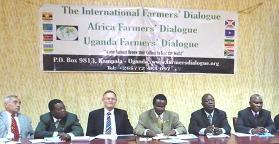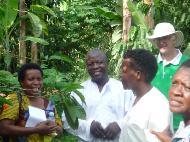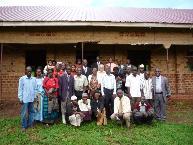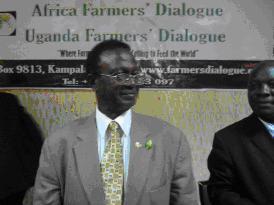 The founding members of the African Farmers’ Dialogue: Julius Khakula, George Kamau and Duncan Nduhiu, Kenya, Martin Simtenda and Juliana K Swai, Tanzania, Jamil Ssebalu, Andrew Mukhwana and Dorothy Tingu, Uganda, Jim Wigan, UK and Claude Bourdin, France were joined by 240 people from East Africa, Sudan and Democratic Republic of the Congo, for the official launch of the Constitution for the African Farmers’ Dialogue. This is phase one of a programme that began four years ago at a Farmers’ Dialogue in Panchgani, India.
The founding members of the African Farmers’ Dialogue: Julius Khakula, George Kamau and Duncan Nduhiu, Kenya, Martin Simtenda and Juliana K Swai, Tanzania, Jamil Ssebalu, Andrew Mukhwana and Dorothy Tingu, Uganda, Jim Wigan, UK and Claude Bourdin, France were joined by 240 people from East Africa, Sudan and Democratic Republic of the Congo, for the official launch of the Constitution for the African Farmers’ Dialogue. This is phase one of a programme that began four years ago at a Farmers’ Dialogue in Panchgani, India.
Phase two is the launch of the Dialogue in Kampala in growing and developing further links with other African countries including French-speaking nations. The ‘African Constitution’ formally presented at the Africana Hotel in Kampala on November 26th has been produced to assist with fund raising and distribution of funds.
Representatives from five African countries who attended an Indian Farmers’ Dialogue in 2005 began working together to help develop agriculture on their continent. Since then their numbers have grown, the effects are obvious in rural development, in agriculture and the personal commitment of each member and their understanding of the challenges facing world agriculture.
 ‘Common people with a commitment can achieve uncommon results,’ said Duncan, who is a farmer in Kenya who received very little formal education. Nine years ago in his village he started a dairy milk cooperative which now has more than 12,000 members.
‘Common people with a commitment can achieve uncommon results,’ said Duncan, who is a farmer in Kenya who received very little formal education. Nine years ago in his village he started a dairy milk cooperative which now has more than 12,000 members.
Meeting with local farmers before and after the launch of the Constitution clearly indicated the potential of these people and their natural resources. But this does not disguise the enormous challenges they face. Famine is still devastating the lives of people in many parts of Africa with deforestation, soil erosion, lack of water-management, roads, transport, and marketing facilities needing to be dealt with.
Many of the officials who attended the launch outlined the challenges confronting Farmers’ Dialogue, as it endeavours to empower farmers to become partners in the rural and agricultural development of Africa. The aims restated are: for farmers to renew their calling to feed humanity, in this case Africa in particular; to empower them through their commitment and vision for the future; to reduce poverty by creating ‘Peace at home and production in the fields’; to exchange ideas and practices in order to master the challenges concerning water, soil, environment; to mobilise farmers in a united approach to agricultural development, whether locally or globally. These officials, organisations and NGOs were called upon to listen to farmers, in order to understand and develop relevant policies and to realise there will be no real development without peace and reconciliation.
Many practical experiences and personal stories showed how change can be introduced giving hope to farmers. Professor Zaake of Makerere University called on everybody ‘to recognise the essential work of farmers, to assess the many small and effective initiatives spreading across the countryside, to increase agronomic research and spread relevant information that can help them.’
A mobilised community has obvious strengths. One example is a project run by Jamil Ssebalu in a small village where young people are taught basic life skills. Jamil was developing his career as a businessman when somebody convinced him to start looking after some young people and give them training. Some years later, this has developed into two training schools with very high technical and ethical standards. The school’s motto comes from the challenging words used by Mahatma Gandhi: ‘Be the change you want to see in the world.’
 Jamil Ssebalu who is Principal of Namasuba College and Chairman of the new Association made it clear that ‘a team of far-thinking farmers is a reality and this needs to be made known, even though many have not received a high level of education.’ His projects continue to grow. He is creating a secondary school in a village some miles west of Kampala where he is encouraging community leaders and farmers to develop rural activities, farm production and social life. It is interesting to see how development is a global issue: when farmers produce enough food, their families can eat properly. When farmers have the possibility to sell their products through private or professional organisations, they earn money that they can use to pay the school fees for their children. Jamil’s vision is that children will multiply the opportunities for development. Some people mentioned the challenge to help young people to understand the real origin of their food, which comes from hard work on the land, not cheaply from big supermarkets. Jamil often sends his students into the villages, to help the villagers and increase the students’ understanding of rural life.
Jamil Ssebalu who is Principal of Namasuba College and Chairman of the new Association made it clear that ‘a team of far-thinking farmers is a reality and this needs to be made known, even though many have not received a high level of education.’ His projects continue to grow. He is creating a secondary school in a village some miles west of Kampala where he is encouraging community leaders and farmers to develop rural activities, farm production and social life. It is interesting to see how development is a global issue: when farmers produce enough food, their families can eat properly. When farmers have the possibility to sell their products through private or professional organisations, they earn money that they can use to pay the school fees for their children. Jamil’s vision is that children will multiply the opportunities for development. Some people mentioned the challenge to help young people to understand the real origin of their food, which comes from hard work on the land, not cheaply from big supermarkets. Jamil often sends his students into the villages, to help the villagers and increase the students’ understanding of rural life.
The marked effects that earlier Farmers’ Dialogues had on farmers did not only motivate them to change their way of farming, but also encouraged them to involve the people of their village and community to start group projects. A Ugandan farmer mobilised his village to plant trees. Juliana from Tanzania, out of concern for women whose husbands have left them, is helping them to start farming by enabling them to own a cow so they can provide for their family. George from Kenya is helping a group of farmers to develop chicken production, which will sustain them during drought, providing food and cash. Symon is working for reconciliation in his area of Kenya so that communities can develop their district.
 Mr John Ntimba, former Ugandan ambassador to India who presided at the official launch of the African Farmers’ Dialogue, underlined three points in his conclusion: ‘The concept of dialogue means that one listens twice as much as one talks. Farmers’ Dialogue is based on the four absolute values promoted by IofC: honesty, purity, unselfishness and love. These are essential for any process of human development.’ He appealed to western countries ‘to find ways of helping Africa which include self discipline in relation to exports which damage African home production.’
Mr John Ntimba, former Ugandan ambassador to India who presided at the official launch of the African Farmers’ Dialogue, underlined three points in his conclusion: ‘The concept of dialogue means that one listens twice as much as one talks. Farmers’ Dialogue is based on the four absolute values promoted by IofC: honesty, purity, unselfishness and love. These are essential for any process of human development.’ He appealed to western countries ‘to find ways of helping Africa which include self discipline in relation to exports which damage African home production.’
Farmers’ Dialogue in Africa is facing many challenges:
- To develop teamwork between countries, starting with Uganda, Kenya and Tanzania. The team members realise the importance of teamwork, honesty, good communication and supporting each other.
- To create and increase contacts with neighbouring countries and in French-speaking Africa.
- To organise and develop activities in each country with formal legal bodies to facilitate this.
- To prepare the next international Farmers’ Dialogue scheduled for May 2010 in Uganda.
- To search for people and finance to help support their activities.
A final comment from Claude Bourdin, ‘The team responsible for the African Farmers' Dialogue needs help, but having worked closely with them for a few days, I can confirm that they have a lot to teach us, to share with us, to stimulate us on our own ways of tackling the challenges facing us in our own countries. So let us continue to work together, and plan that humanity everywhere will be adequately fed.’



